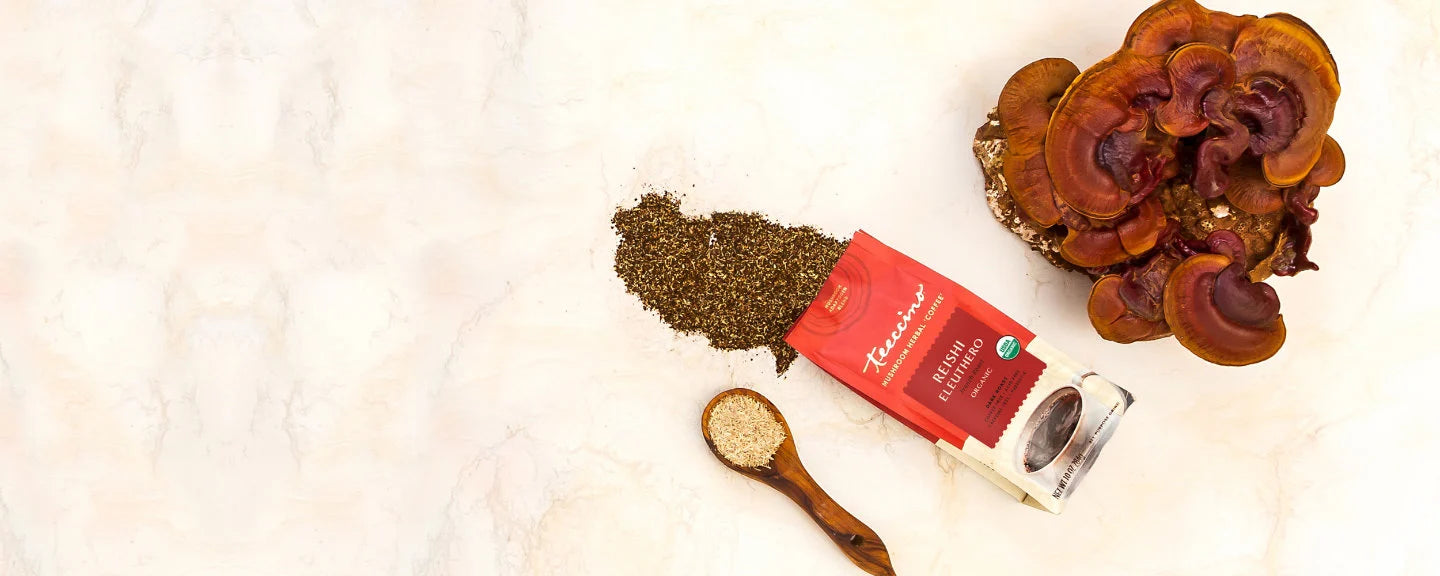Wellness Mushrooms

Wellness Mushrooms
Find more ingredients:
Adaptogenic mushrooms that protect your body and mind!
Teeccino’s Mushroom Adaptogen blends optimally pair wellness mushrooms with long traditions of beneficial use in Asia together with adaptogenic herbs sourced from all over the world to enhance their combined health benefits.
Certain mushrooms and herbs qualify as adaptogens that help your body cope with any kind of stress while increasing endurance and enhancing immunity. Regularly consuming adaptogens is one of the best ways you can enhance your health on a daily basis. What more enjoyable way than to drink them in a cup of Teeccino?
Bioactive compounds found in adaptogenic mushrooms called polysaccharides are responsible for a myriad of health benefits. For instance, beta glucans, one of the many health-promoting polysaccharides found in some mushrooms, have been recognized by the FDA for their heart-healthy effects and also have been shown to be prebiotics for the microbiome. Wellness mushrooms contain a wide variety of antioxidants, energy-promoting and inflammation-reducing compounds that aren’t found in common foods. Thus, you broaden your body’s array of defenses by consuming adaptogenic mushrooms as part of your diet.

Mushroom fruiting bodies versus mycellium
The wellness properties of mushrooms are found in both the “fruiting bodies” (what we think of as mushrooms) and the mycelium (like the roots and branches of mushrooms). Although traditionally only the fruiting bodies of mushrooms were consumed, recent studies have revealed that the mycelium also has health-promoting compounds. We decided to include both parts of the mushrooms in Teeccino Mushroom Adaptogen blends because each provides valuable health benefits.
Our mycelium is organically grown in the US on a gluten-free ancient grain substrate called sorghum, which is 95% absorbed by the mycelium. Most commercially cultivated mycelium is grown on oats and rice, where the starch is only 60-70% absorbed. In other words, our mycelium contains less starch and has more concentrated health benefits than rice or oat-cultivated mycelium.
Our mushroom fruiting body extracts are organically grown and extracted in China where they have been cultivating and extracting mushrooms for centuries. The traditional way to consume wellness mushrooms is in a hot water extraction like a tea. The polysaccharides and other bioactive compounds in mushrooms are water soluble. Teeccino’s mushrooms are extracted in water, concentrated, and then dried.
Teeccino Mushroom Adaptogen blends don't taste like mushrooms!
We blend an effective quantity of our selected mushroom extracts with Teeccino’s roasted herbs plus adaptogenic herbs and other health-promoting ingredients to add to their wellness benefits as well as make the blend taste good. Caroline is a firm believer that all Teeccino blends should be delicious first and foremost. If you need encouragement to taste our Mushroom Adaptogen blends, read our product reviews on each product page to see that many customers are surprised that Teeccino’s Mushroom Adaptogen blends don’t taste like mushrooms!

Cordyceps (Cordyceps militaris)
Famed for giving Chinese Olympic athletes the energy boost they needed to win multiple gold medals, cordyceps holds the reputation of enhancing stamina and endurance. Studies show consuming it can optimize a person's oxygen intake, help stabilize blood sugar and speed up muscular recovery after exercise. But the benefit that has made cordyceps so in demand in Asia is its reputation for increasing the libido.
Not really a true mushroom, Cordyceps sinensis is a parasitic fungus that grows only in the high-altitude meadows of the Himalayan mountains. When the world discovered that traditional healers recommend it for enhancing sexual desire and performance, the price for the wild fungus soared to over the price of gold! Sadly, this is a common story in the wild harvest world where spikes in demand cause species to become endangered. Typically, a commercial technique for growing the ingredient is then developed. However, cultivating a wild fungus like cordyceps is more challenging than usual.
Cordyceps fungi develop when the parasite takes over and eats the larval body of a ghost moth and eventually grows its fruiting body out of the head of the dead caterpillar. If that sounds yucky to you, never fear, commercial cordyceps isn’t grown that way!
Fortunately, Chinese scientists tested wild Cordyceps sinensis against a number of other species of corydceps fungi and they identified one, Cordyceps militaris, which has comparable effects and, in some ways, is even more potent. It can also be cultivated without using any insects – whew!

Reishi (Ganoderma lucidum)
Reishi, revered for over 2000 years in Asia as the “Mushroom of Immortality,” is thought to impart vital energy while refreshing the mind and body. The ancient Taoist faith in reishi mushroom’s ability to protect one’s health was so strong, they rated it as more important than ginseng and believed it helped one develop the spiritual strength to become immortal. Science is now studying the polysaccharides in reishi, which are thought to promote longevity by boosting the immune system and protecting cells when they divide.
Reishi is one of the most powerful mushroom adaptogens, helping your body cope with stress and inflammation while supporting immune function. Studies show that Reishi has an impact on white blood cells and can increase the activity of natural killer cells and lymphocytes, which are types of white blood cells that fight infection.
Reishi’s antioxidants and polysaccharides are some of the active ingredients that help reduce stress reduction and protect the liver. Reishi is reputed to fight fatigue and improve circulation. With hundreds of bioactive compounds, reishi also has an impact on anxiety, irritability and stress. Of course, when you feel better, which can result from taking reishi daily, your mood improves too!

Lion's Mane (Hericium erinaceus)
Lion's Mane mushroom is a delicacy prized for its delicious flavor and texture and its beneficial effects on the brain. Studies show that lion’s mane extracts stimulate the growth of neurites which then form complex neuronal circuits necessary for memory and learning. Lion’s mane has neuroprotective effects that can help regenerate damaged nerve cells.
Hericenones and erinacines are two compounds found in lion's mane that encourage the production of neurites. Studies suggest that lion's mane mushroom also has heart-healthy effects on cholesterol and triglycerides which may be due to its beta-glucan content. It has been shown to help protect the stomach and digestive tract from H. pylori, the bacteria responsible for gastric ulcers.
Taking Lion’s mane on a regular basis can reduce anxiety, depression and inflammation while helping to control blood sugar levels. Although lion’s mane has been shown to help reduce fatigue, it also can improve the quality of sleep. By improving mental health and reducing inflammation, the body is able to relax into Stage 4 deep sleep where regeneration and repair takes place.
Like other wellness mushrooms, the polysaccharides in lion’s mane also enhance healthy immune system function. Traditional Chinese medicine believes that lion’s mane supports the body’s “qi” or vital energy and it is often prescribed for people who need a restorative for both physical and mental performance.

Turkey Tail (Trametes versicolor)
Turkey tail is a colorful wild mushroom that grows on dead logs and tree bark throughout the world. It has been used by healers for centuries to fight infection, prevent illnesses like the common cold and bolster the immune system.
Turkey tail has been studied for its effects on cancer patients undergoing chemotherapy in order to help them maintain a healthier immune function and assist the effectiveness of the chemotherapy. The presence of the active compound Polysaccharide K, called PSK, in turkey tail helps repair immune cell damage. Another compound, polysaccharopeptide, or PSP, is found in the mycelium and it has been shown to boost the activity of microphages which attack and consume pathogens.
The mycelium of turkey tail contains prebiotics that nourish your probiotics, the beneficial microflora that improve gut health. The microflora in your gut need a wide variety of prebiotics to keep a diverse population of over a thousand species of probiotics flourishing. Drinking turkey tail daily can help enhance your immune system through multiple actions that help keep various immune functions active and strong.

Chaga (Inonotus obliquus)
Referred to as ‘The Gift of the Gods’ and ‘The King of Mushrooms’ by Siberian natives who live in the coldest of climates and need protection from stress and the elements, Chaga mushroom grows wild on birch trees throughout the northern hemisphere. Similar to a burl in appearance, chaga pulls betulin out of its host birch tree and converts it to betulinic acid, which supports healthy cell division and the body’s response to inflammation. Chaga works to protect immunity by supporting the production of cytokines, lymphocytes, and interleukin 6, all of which play an important role in the functioning of the immune system.
Chaga has one of the highest ORAC (oxygen radical absorbance capacity) scores of any other herb, spice fruit, or vegetable. Its health promoting properties are in large part due to its high antioxidant content.
Chaga has been tested in mice challenged to swim long distances after consuming an extract of chaga. It was found that the mice had increased endurance with a greater amount of available glycogen to convert to energy and with decreased lactic acid levels in the bloodstream resulting in a quicker recovery from activity.
Teeccino’s chaga is wild harvested in Finland, where long winters and harsher climatic conditions contribute to a higher concentration of health-promoting properties. Traditionally, chaga is ground and brewed into a tea that has an earthy, slightly bitter, coffee-like flavor, making it a perfect addition to Teeccino’s bold, roasted herbal blends.

Tremella (Tremella fuciformis)
Tremella is a tropical mushroom also known as the "snow fungus" which has been used in China for centuries to promote lasting beauty. One of four renowned beauties of the Chinese Imperial Tang dynasty, concubine Yang Guifei (713 to 756) credited tremella with preserving her beauty. Unfortunately, it didn’t protect her from the Emperor who ordered her death after what he believed was her family’s betrayal. He mourned her ever after and had a statue made in her image that he went regularly to gaze at with a broken heart.
Tremella is thought to prevent signs of aging such as wrinkles, and even repair damaged skin with its rehydrating qualities similar to hyaluronic acid. Its polysaccharides and gelatinous texture plus high vitamin D content all work together to support beauty from within.
Tremella is also a rich source of dietary fiber, which along with its polysaccharides, helps protect long-term health and immunity. Like other medicinal mushrooms, Tremella also has been studied for its antioxidant and anti-inflammatory properties.

